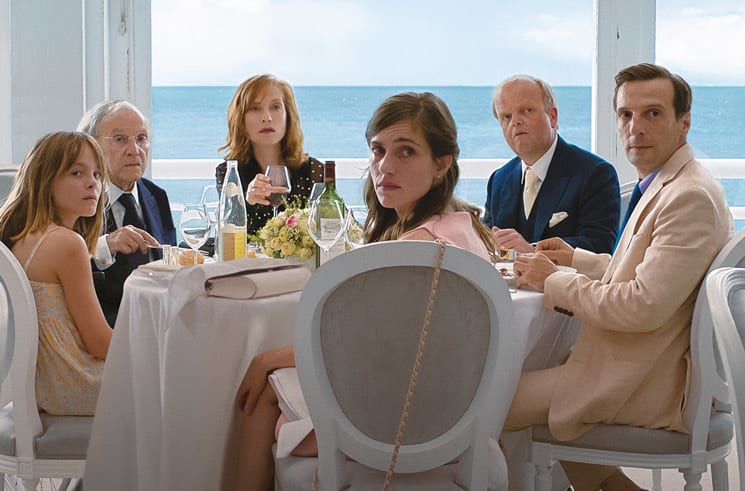Is there a filmmaker more preoccupied with revisiting themes from his body of work these days than Michael Haneke? In 2017, you could count Woody Allen and David Lynch as his contemporaries, and it's with Happy End, Haneke's first film in five years, that the Austrian director enters into their company as "old white guys who are proudly out of touch with the modern world." This isn't a criticism (see Lynch's groundbreaking work on the most recent season of Twin Peaks), so much as a mindset and a formal shorthand; Haneke's been accused of thematic familiarity since Caché in 2006, but the director has always sidestepped easy takedowns by injecting his films with a political verve that's disappointingly missing in his new film.
After steering away from his mid-2000s genre exercises, Haneke has spent the better part of the 2010s convincing everyone he's a more serious director, winning the Palme d'Or twice and scoring Oscar nods and wins for 2009's The White Ribbon and 2012's Amour. But while those films certainly garnered respect from North American audiences, they lacked the kick, the winking arthouse edge and the self-reflexive and darkly comedic spirit of the films that brought Haneke to the forefront of the international scene in the late 90s.
Happy End is Haneke's attempt to get back to basics, a thematic cocktail made from equal amounts of the surveillance culture of Caché (updated here to include muddled commentary on social media and SnapChat in particular), the international politics of Code Unknown and the "old people dying" of Amour — and it doesn't go down quite right. Eventually, a plot begins to take shape, as a wealthy family living in Calais has to deal with hidden relationships, dark secrets and a stepdaughter who just may harbour an interest in murder. The family drama plays out effectively enough, and a late-film turn that revisits the end of Amour brought out knowing chuckles from at least one press screening this festival. But, like the refugees who remain around the edges of the film with only the faintest criticism of the ongoing crisis, we as the audience aren't given nearly enough to have any narrative satisfaction.
That's not to say Haneke still can't pull off fascinating sequences. A mid-film interlude set to Sia may be one of this year's most compelling moments, one that continues long past the point we expect. As well, an early montage of unmediated surveillance images, stripped of their context, have a chilling effect (albeit one that is stripped away quite early in the film). Ultimately, though, Happy End comes off as slightly shrug-worthy, a footnote to a long career of far more successful films.
(Mongrel Media)After steering away from his mid-2000s genre exercises, Haneke has spent the better part of the 2010s convincing everyone he's a more serious director, winning the Palme d'Or twice and scoring Oscar nods and wins for 2009's The White Ribbon and 2012's Amour. But while those films certainly garnered respect from North American audiences, they lacked the kick, the winking arthouse edge and the self-reflexive and darkly comedic spirit of the films that brought Haneke to the forefront of the international scene in the late 90s.
Happy End is Haneke's attempt to get back to basics, a thematic cocktail made from equal amounts of the surveillance culture of Caché (updated here to include muddled commentary on social media and SnapChat in particular), the international politics of Code Unknown and the "old people dying" of Amour — and it doesn't go down quite right. Eventually, a plot begins to take shape, as a wealthy family living in Calais has to deal with hidden relationships, dark secrets and a stepdaughter who just may harbour an interest in murder. The family drama plays out effectively enough, and a late-film turn that revisits the end of Amour brought out knowing chuckles from at least one press screening this festival. But, like the refugees who remain around the edges of the film with only the faintest criticism of the ongoing crisis, we as the audience aren't given nearly enough to have any narrative satisfaction.
That's not to say Haneke still can't pull off fascinating sequences. A mid-film interlude set to Sia may be one of this year's most compelling moments, one that continues long past the point we expect. As well, an early montage of unmediated surveillance images, stripped of their context, have a chilling effect (albeit one that is stripped away quite early in the film). Ultimately, though, Happy End comes off as slightly shrug-worthy, a footnote to a long career of far more successful films.
